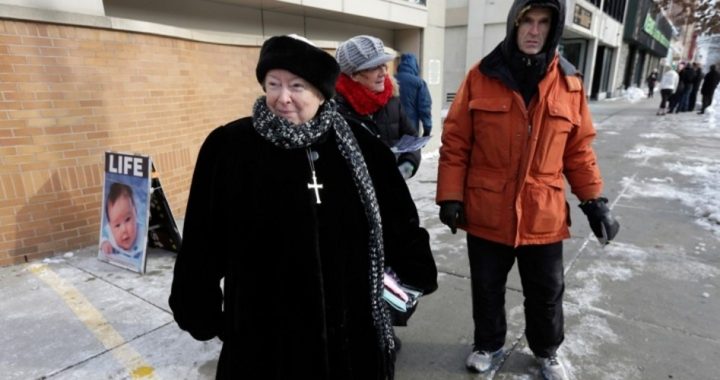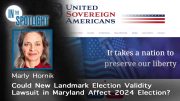
The U.S. Supreme Court on Wednesday will hear arguments for and against a Massachusetts law that forbids abortion opponents from entering a 35-foot buffer zone in front of entrances to facilities where abortions are performed. The law, aimed at preventing conflicts among abortion protestors or counselors and clients and escorts at abortion clinics, is being contested by Eleanor McCullen (shown), who regularly stands outside a Planned Parenthood clinic in Boston and attempts to persuade young women entering the site against having an abortion. McCullen contends the ban on approaching and speaking to people within the buffer zone is an unconstitutional violation of the free speech rights protected by the First Amendment of the Constitution of the United States. Martha Coakley, the Massachusetts attorney general and the defendant named in the suit, claims the current law strikes the right balance among legitimate, but competing interests.
“This law is access balanced with speech balanced with public safety,” Coakley told the New York Times. “It has worked extremely well.” McCullen, 77, told the Times that the semi-circular yellow line, within which all contact and communication with people approaching the clinic is forbidden, frustrates her efforts to speak to women entering the clinic grounds. In a 2011 deposition, McCullen said she has been able to persuade more than 80 women not to have an abortion even after the buffer zone was imposed, but said the 2007 law has caused her to miss four to five opportunities to speak with clinic-bound women on each day that she maintains her twice-weekly vigil.
The buffer zone is on a public sidewalk where pedestrians going elsewhere may freely pass. People going into or coming from the clinic are obviously allowed to go through the zone, as are clinic employees and volunteer escorts who are likely to speak to and encourage the women they accompany into the clinic to go through with whatever planning and procedures they are seeking, including abortion. That makes the restriction on speech content-based, argues Mark L. Rienzi, who is representing McCullen and other protestors and sidewalk counselors.
“The government does not have the ability to decide that its public sidewalks are open for speakers on one side but not speakers on the other side,” Rienzi told the Times.
Coakley said the law is a necessary measure taken by the state in an effort to deal with a history of harassment and sometimes violence at abortion clinics in Massachusetts, including a December 1994 shooting rampage at two Brookline clinics that left two clinic workers dead and five others wounded. The shooter, John C. Salvi III of North Hampton, New Hampshire, was convicted and sentenced to life in prison without parole in March 1996 and was found dead in his prison cell in an apparent suicide in November of that year. While Massachusetts has no death sentence, it seems unlikely that anyone willing to risk imprisonment for murder or other acts of violence would be deterred by a painted line on a sidewalk where mere speech by abortion foes is prohibited.
The state in McCullen v. Coakley is asking the high court to follow the precedent of Hill v. Colorado, a 2000 ruling in which the court upheld a law creating 100-foot buffer zones outside all healthcare facilities, in addition to a prohibition on coming closer than eight feet of anyone within the zone. The composition of the court has changed since then, with two key members of that six to three majority — the late Chief Justice William Rehnquist and retired Justice Sandra Day O’Connor — replaced by Chief Justice John Roberts and Justice Samuel Alito. Justice Anthony, who continues to be a closely watched “swing vote” between the court’s conservative and liberal blocs, was one of the three dissenters in the Colorado case.
The ruling, Kennedy wrote, ran contrary to “more than a half-century of well-established First Amendment principles” by upholding “a law which bars a private citizen from passing a message, in a peaceful manner and on a profound moral issue, to a fellow citizen on a public sidewalk.” In an e-mail to the Times, constitutional lawyer Floyd Abrams said the Massachusetts law likewise constitutes an abridgement of constitutionally protected freedom of speech.
“The protections of the First Amendment do not evaporate the closer one comes to an abortion clinic,” Abrams wrote. “Access must be protected; so must speech.”
Should the court rule in McCullen’s favor, however, it may be looked upon as the latest in a long series of precedents that say, in proper legal and scholarly language, that legislators and other citizens must do as the justices say, not as the justices do. In a brief filed for Planned Parenthood in defense of the Massachusetts law, former acting U.S. solicitor general Walter E. Dellinger III reminded the justices that they forbid protests on the Supreme Court’s plaza.
Correction: An earlier version of this article mistakenly stated that attorney Mark Rienzi, who is representing the Becket Fund for Religious Liberty in another high-profile case, is working for the Becket Fund in representing the Eleanor McCulen and other abortion protestors in McCullen v. Coakley. He is not.
Photo of Eleanor McCullen: AP Images



